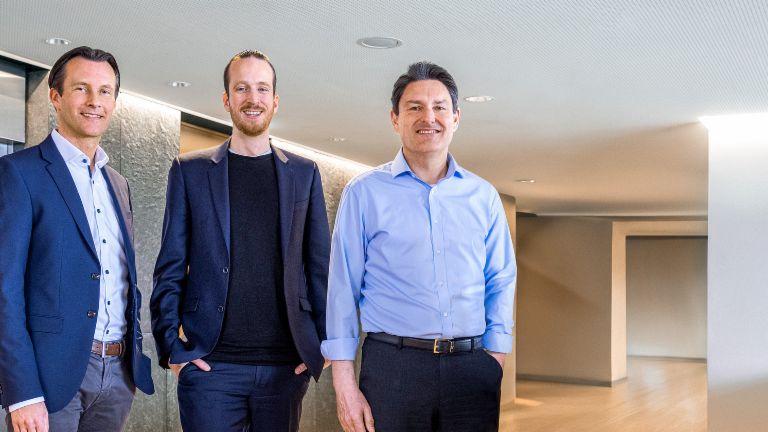- One in four invoices is paid late or not at all.
- Poor payment discipline puts every fifth European company at risk of existence.
- Only a good third relies on external service providers for receivables management.
- In Germany, payment morale is among the highest in European comparison.
Around 18 billion invoices are issued across the EU every year, but payment morale in Europe is in a bad state: Approximately one in four invoices is paid late (19 percent) or not at all (5 percent). This is shown by the EOS study "European Payment Practices 2025", for which 2,200 financial managers from 11 countries were surveyed.
Compared to other countries, Germany is among those with the best payment morale: here, 22 percent of invoices are paid late (17 percent) or not at all (5 percent). Switzerland (21 percent) and France (22 percent) perform similarly well. In Romania, payment morale is the worst in a European comparison. There, 29 percent of defaulting payers settle their invoices late or not at all.
Many customers consciously accept a delayed payment.
European companies primarily cite short-term liquidity bottlenecks of their private customers (54 percent) and forgetfulness (51 percent) as reasons for late payment or even payment default. In Germany, every second company suspects liquidity bottlenecks as the reason for payment delays, with forgetfulness being the second most frequently mentioned reason by respondents (47 percent).
For business customers, the European average primarily cites payment defaults by their own customers (61 percent) and the exploitation of supplier credits (57 percent) as reasons. However, slow, non-digitized processing procedures (48 percent) also likely cause delays, according to the respondents. 43 percent see over-indebtedness and insolvencies of their business partners as the cause of unpaid invoices.
In Germany, 47 percent of respondents each suspect that payment defaults by their own customers and the exploitation of supplier credits are reasons for poor payment morale.
Particularly challenging for companies: Some customers apparently do not pay late by mistake. Around a third of European companies assume that both business customers (31 percent) and private customers (34 percent) deliberately do not pay their invoices. German companies have more trust in their customers' payment morale: here, only 18 percent suspect intentional non-payment from their business customers and 24 percent from their private customers.
The companies have shortened their payment terms.
As a result of poor payment morale, European companies grant their customers less time to settle open invoices. At an average of 31 days, the set payment term is at a low in the ten-year trend (business and private customers). In 2015, it was still 34 days, and in 2022, even 37 days.
Private customers in Europe are now granted an average of only 23 days to pay, and business customers 36 days. Only Spanish companies are more generous: they grant their private customers a comparatively long period of 31 days and business customers 42 days. In Germany, the average payment term is slightly below the European average: private customers have 22 days to pay their invoices, business customers can expect 31 days.
The fact that defaulting private customers pay their invoices on average faster than defaulting business customers probably doesn't play a role here. They settle their invoices on average 19 days, and business customers 21 days, after the payment deadline. In Germany, private customers pay their liabilities on average 20 days, and business customers 23 days, after the due date.
The consequences of poor payment morale for the economy are serious.
Payment delays and defaults are not without consequences: Almost every second surveyed company stated that it had suffered profit losses in the past because of this (48 percent), 46 percent stated that this led to higher interest costs, and for 34 percent even to liquidity bottlenecks. For every fifth company (22 percent), investments were cut or halted. In France and Slovenia, every fifth company even had to fear for its existence; the European average is 16 percent. In Germany, 41 percent stated that profit losses occurred, 22 percent of respondents said they cut their investments, and 12 percent stated that they had to fear for their existence.
Eva Griewel, CFO of the EOS Group: "The longer companies have to wait for their money, the more likely it is that the invoice will not be paid at all. In this respect, payment morale is an important indicator for potential payment defaults. If the number of such defaults increases sharply, it can drive creditor companies themselves into insolvency, with the resulting negative effects such as the loss of numerous jobs."
The weak economy offers little hope that payment behavior could improve in the near future: Every fifth European company (22 percent) expects to face even more payment delays and defaults in the next two years. Germany is among the most pessimistic countries: here, 28 percent of the surveyed companies expect payment behavior to worsen, while only 8 percent predict an improvement.
Professional receivables management ensures security.
"Our current study shows that poor payment morale in Europe represents a serious challenge for companies. Although NPL (Non-Performing Loan) volumes at banks are currently at a low level overall, we must not underestimate the impact of delayed or outstanding payments. Companies should prepare, because this development places high demands on companies' liquidity management," warns CEO Marwin Ramcke.

For creditors worldwide, receivables management is becoming increasingly complex and riskier, also due to the globally uncertain situation.
The consequences of poor payment morale for creditors can be mitigated with professional dunning. However, so far only 37 percent of European companies rely on external support for receivables management. In Germany, this figure is slightly higher at 40 percent. Just under a third of European companies take a dual approach, handling outstanding payments both internally and through external service providers; in Germany, it is also a third. Only 7 percent consistently rely on professionals in receivables management. This exactly matches the European average.
Debt collection is increasingly becoming a success factor for many companies.
"For creditors worldwide, receivables management is becoming increasingly complex and riskier, also due to the globally uncertain situation," says Marwin Ramcke. In view of their customers' declining payment morale, companies should therefore carefully weigh the economic risks of payment delays and defaults and consider collaborating with a professional debt collection service provider.
Would you like to learn more about the current EOS study? Please feel free to contact us.

Carina Bonde
Corporate Communications & Marketing
Phone: + 49 173 2979331
Explore more from EOS



